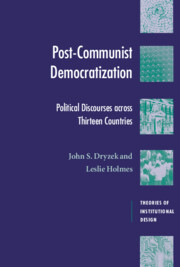Book contents
6 - Russia
Published online by Cambridge University Press: 22 September 2009
Summary
Russia has very little in its deep history to recall in support of any post-communist democratization process. For centuries, the country was part of the large Russian Empire under a tsarist autocracy. The final years of this autocracy, especially after October 1905, saw some modest reforms such as an elected Duma (parliament). But these were limited in both the nature and extent of the suffrage and the actual powers of the Duma. The tsarist system was overthrown in February 1917, replaced by a weak provisional government that lasted only eight months. In October 1917 Lenin and the Bolsheviks took power in a coup. The Bolsheviks did permit elections to a constituent assembly in January 1918, but disregarded the results, which were not to their liking. Following a civil war (1918–20) and a revolt by many of their own supporters (the Kronstadt revolt, 1921), the Bolsheviks decided not to tolerate the other political parties they had permitted since 1917; by mid-1921, the country was a one-party dictatorship. In the following year, the Soviet Union (Union of Soviet Socialist Republics) officially came into existence. Political power then became ever more centralized.
However, we do not maintain that the absence of a democratic tradition precludes a country's democratic development. While evidence suggests that some experience of democracy and constitutionalism facilitates any particular democratization project, if such experience were a sine qua non, existing Western states could never have established themselves as democracies.
- Type
- Chapter
- Information
- Post-Communist DemocratizationPolitical Discourses Across Thirteen Countries, pp. 92 - 113Publisher: Cambridge University PressPrint publication year: 2002



